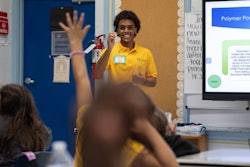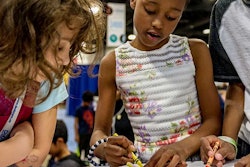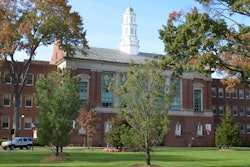A new report issued by the American Museum of Natural History (AMNH) notes that many Black, Indigenous, and People of Color (BIPOC) students find their STEM studies are precarious in light of the pandemic.
Thanks to a National Science Foundation (NSF) rapid grant, researchers at AMNH have begun studying the impact of virtual learning on STEM students. This week, AMNH issued a mid-project report titled, “Supports and Challenges in an Educational Crisis: The Impact of the COVID-19 Pandemic on Youth STEM Pathways,” which examines how students are reacting to disruptions in their studies.
 Dr. Preeti Gupta
Dr. Preeti GuptaThe 190 subjects for the study are alumni of the AMNH’s Science Research Mentoring Program (SRMP), where high school students in New York City take part in scientific research either at the museum or at partner programs that provide science mentoring to students. 80% of the participants identified as BIPOC.
The survey sought to identify the impact of the educational disruptions and loss of opportunities, such as internships on college undergraduates typically underrepresented in science. The survey also sought to highlight what supports and resources these individuals accessed to mitigate the disruptions. The research team included AMNH staff and college students from the New York area serving as co-research fellows.
Before the pandemic, AMNH researchers were tracking SRMP alumni, collecting data and examining their pathways, trajectories, opportunities and obstacles.
“We were able to get an NSF grant to systematically collect data from those specific students that we were already following to understand how the pandemic may or may not be affecting their ability to persist with STEM courses,” said Dr. Preeti Gupta, director of youth learning and research at AMNH.
NSF rapid grant money is intended for quick release of findings so that possible solutions can be offered. Researchers continue to collect data for further reports.
“We want to get it in the hands of many different kinds of people who have agency to do something to support students, including students themselves,” said Gupta.
Almost 50% of the students in the study reported that their academic trajectory has been greatly or moderately affected by the pandemic. Students reported factors such as virtual learning, fears about performance, loss of opportunities, displacement from on-campus support networks and moving to a location where there wasn’t a quiet place to study.
Of the 147 participants (78%) who have already declared a STEM major or are planning to, 15% have or are considering leaving STEM for other disciplines and 26% reported the pandemic is impacting degree completion.
“What we are understanding from the data is that in some cases the STEM courses are happening without the lab work,” said Gupta. “The colleges are responding by giving students more assignments and more to do on their own, which is creating a lot of anxiety for the students.”
Some respondents indicated that classes are not as in-depth. While their grades remain stable, they’re concerned they are not receiving the rigorous training needed for graduate school or the workplace. Other students are concerned about their grades and how underperforming can have lasting impact.
Students looking toward graduate school are concerned that lack of internships will make their applications weaker. Gupta also noted that being in a lab gives students the motivation to persevere.
“From an identity perspective, there is no way for those students to keep shaping their identity in authentic ways,” said Gupta. “As researchers, we have to think how else we can support identity development that serves as a replacement for internships for the time being.”
 Mahmoud Abouelkheir
Mahmoud AbouelkheirMahmoud Abouelkheir, a co-research fellow on the report and an alum of a SRMP partner program, said he graduated DePauw University a semester early with a major in biochemistry because he had planned to spend the spring semester completing a second major in cellular and molecular biology. The classes he was planning on taking to finish out the major were not being offered and the alternative courses did not work with his schedule.
“The nature of doing remote classes was pretty isolating,” Abouelkheir said. “I had grown used to doing things with community members and with other students in my major and my classes. Things like sharing study spaces at the library, eating in the campus dining hall. Those were really important to my time in college. The pandemic totally took those away from me.
“The lack of community resources was pretty hard for me,” he added.
Now, Abouelkheir is preparing for graduate school. He had several internships prior to the pandemic and his grades did not drop, but he didn’t feel he learned as much in the remote format. He has been accepted to two graduate programs and is currently considering which to attend.
“I love research. It’s something I’ve been working toward since I participated in the Science Research Mentorship Program,” he said.
Abouelkheir said including the co-researchers from the demographic being studied is valuable for the content of the report.
“Help design or inform some of the questions being asked and how we should move forward,” he said.
AMNH is putting together a support system for SRMP alumni to start in September should students still be engaged in remote learning. Among the strategies Gupta noted are virtual study groups, whether they’re studying the same subject together or simply simulating a library or study space, so they feel a sense of togetherness.
Among the suggestions offered in the report are to tap into and build networks so STEM students don’t feel isolated. Students should not hesitate to advocate for themselves. This can include contacting faculty, department chairs and advisors to discuss concerns and ask for assistance in fulfilling requirements that may currently be unavailable.
The report encourages faculty members to reach out to STEM students and offer support in navigating challenging assignments. Additional suggestions are offered for mentors, family members and non-profit organizations.
“Our long-term goal is to keep figuring out how to best support BIPOC students to persist with STEM careers,” said Gupta.
“The study is going to be useful for educators and those who are informing the policy at schools and institutions as well as for students who may be feeling discouraged with where they are at in trajectory,” said Abouelkheir, who hopes it will help students feel less alone. He mentioned the need for more mental health resources and more career professional development.
“These results can help universities and institutions provide and step up at the areas where there are deficiencies,” said Abouelkheir.
Additional information can be found at amnh.org/stayinginscience.



















